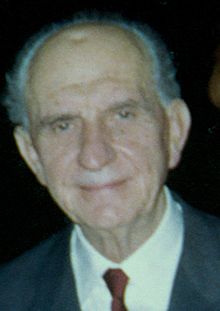Also known as:
Georgios Papandreou, Γεώργιος Παπανδρέου
More People of Greece
More Topic Categories
Related Destinations
George Papandreou (13/02/1888 - 01/11/1968)
 George Papandreou was a Greek politician of modern Greece. He was thrice Prime Minister, and he was also known as the “Elder of Democracy”.
George Papandreou was a Greek politician of modern Greece. He was thrice Prime Minister, and he was also known as the “Elder of Democracy”.He was born in Kalentzi, Achaia, where he started his primary education. He later studied at the second high school of Patra, after his father was transferred there. In 1901, he lost his sister Magdalene to tuberculosis. He later enrolled at Law School of the University of Athens, before going to Berlin to study political science. It was there that he met Eleftherios Venizelos. The latter was impressed with Papandreou and appointed him director of his political office in 1916, as well as prefect of Lesvos. He married Sophia Mineiko, daughter of a Polish aristocrat, and had a son, Andreas Papandreou.
During a dispute concerning Greece’s participation in World War I, Papandreou was one of the fiercest supporters of Venizelos. When Venizelos was forced to abandon Athens, Papandreou initially followed him to Crete, before going back to Lesvos, in order to rally supporters and neutralize royalists. He also supported the revolutionary government of National Defense of Venizelos in Thessaloniki. In 1921, there was an attempt to murder him, while the following year, he participated in the Plastiras-Gonatas revolution that removed King Constantine from the throne.
In the years that followed, Papandreou was elected Member of the Parliament under Venizelos’ Liberal Party, and undertook the Ministry of Internal Affairs and, later, the Ministry of Finance. During the Pagkalos dictatorship, he was exiled. After his return, he undertook the Ministry of Education and the Ministry of Transportation. As a minister of education, Papandreou was linked with the creation of 3,200 new schools and an extensive reformation in the educational system.
A supporter of democracy, he was exiled by the dictatorship of Metaxas in 1935 to Andros and Kythera. During the German Occupation in World War II, he was arrested by Italians as the editor of an illegal newspaper called “Freedom”. In 1944, he went on the side of the exiled royal government in Egypt, and he soon flew to Cairo in order to create a coalition government. After the War, he continued his political career and was elected numerous times.
In 1961, he founded the Centre Union party, consisting of previously liberal pro-Venizelists and disappointed royalists. He lost the elections of that year, but won in the 1963 elections and he formed a minority government. However, as he wanted to gain majority, he dissolved the government; in the following elections, he received 52.8% of the votes. He followed a progressive policy, which caused disturbance in the conservative circles. Later, he had a series of disputes with King Constantine II, and was forced to resign. This eventually led to a period of instability, culminating in the coup of 1967. Papandreou was sentenced to house arrest, and he died in 1968. His funeral became the reason for the first protest of Greeks against the dictatorship.
See Also:
 Athens Photos
Athens Photos
 Santorini Photos
Santorini Photos
 Crete Photos
Crete Photos
 Meteora Photos
Meteora Photos
 Corfu Photos
Corfu Photos






